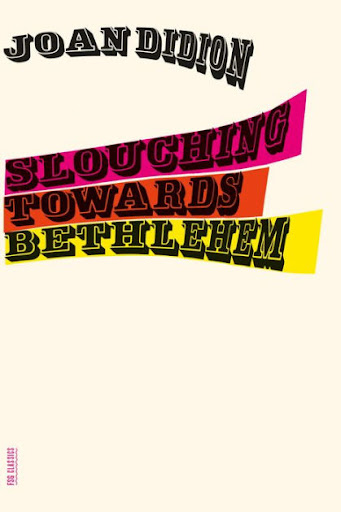"Slouching Towards Bethlehem" was a book I've been meaning to read for a while after I stumbled upon it one day in The Strand. I've always admired Joan Didion and loved passages of her work that I've came across, but had never fully read one of her books before.
Needless to say, I fell in love with her as a writer and as a person after reading this collection of essays from the late 1960s. This time in California has always fascinated me, as it was a period and a culture that sprung forth suddenly from the extremely conformist and cookie-cutter era of the 1950s.
What made her accounts of life in the Haight different from some other accounts, however, was that she was there. She was roaming the streets, talking to people (both anti-establishment and pro-establishment), sitting with locals as they got high out of their minds, and she truly captured the feeling of what it was like to actually be there in a vivid manner for readers, both then and now decades removed from the era of the Summer of Love.
As a journalist, I don't believe in the notion that we are supposed to be impartial and objective at all times. In fact, I think it's humanly impossible. If we see something horrible happen in front of us, like a brazen act of violence, we're going to have feelings of disgust and may even try to step in, depending on what kind of ethics you have.
In "Slouching," Didion doesn't ever tap into her thoughts on the people she encounters from a biased perspective. Rather, she chronicles their actions and thoughts through an observant lens, simply taking note of what was said and done in the streets at the time. This is truly powerful, especially now in an area of extreme sustained polarization in the US when politicians are even attacking each others' looks and personalities, in addition to policies.
Other essays capturing the zeitgeist of California in the late 1960s are profound as well. She captures the loneliness, the yearning, the frenetic energy in a beautiful, unparalleled and skillful way.
I had always perceived Joan Baez as a semi-radical, outwardly hippie activist based on her associations with Bob Dylan, but the essay Didion wrote about the locals in the town where Baez was constructing The Institute for the Study of Nonviolence showed her as a much more nuanced person, not hyper radical as so many other hippie singers and activists were at the time.
There's an essay about John Wayne, an essay about a murderer in Utah, and my favorite, a beautiful essay about what it was like to grow up in Sacramento, "Notes From a Native Daughter," and then revisit as an adult.
I love this essay. It has the same feeling as Truman Capote's short story "House of Flowers", which I still remember 14 years after reading it. I think because she doesn't paint Sacramento as a utopia or paint it with saccharine memories that it stands out. In fact, there is an element of melancholy as she recounts the slow way of living and its history rooted in the economic dominance of a few families.
After reading "Slouching," it was evident Joan was one of the greatest journalists of all time in the way that she elegantly documented historical events and eras. I also purchased "The White Album," which I look forward to reading and reviewing soon.
Rating: 10/10



Comments
Post a Comment